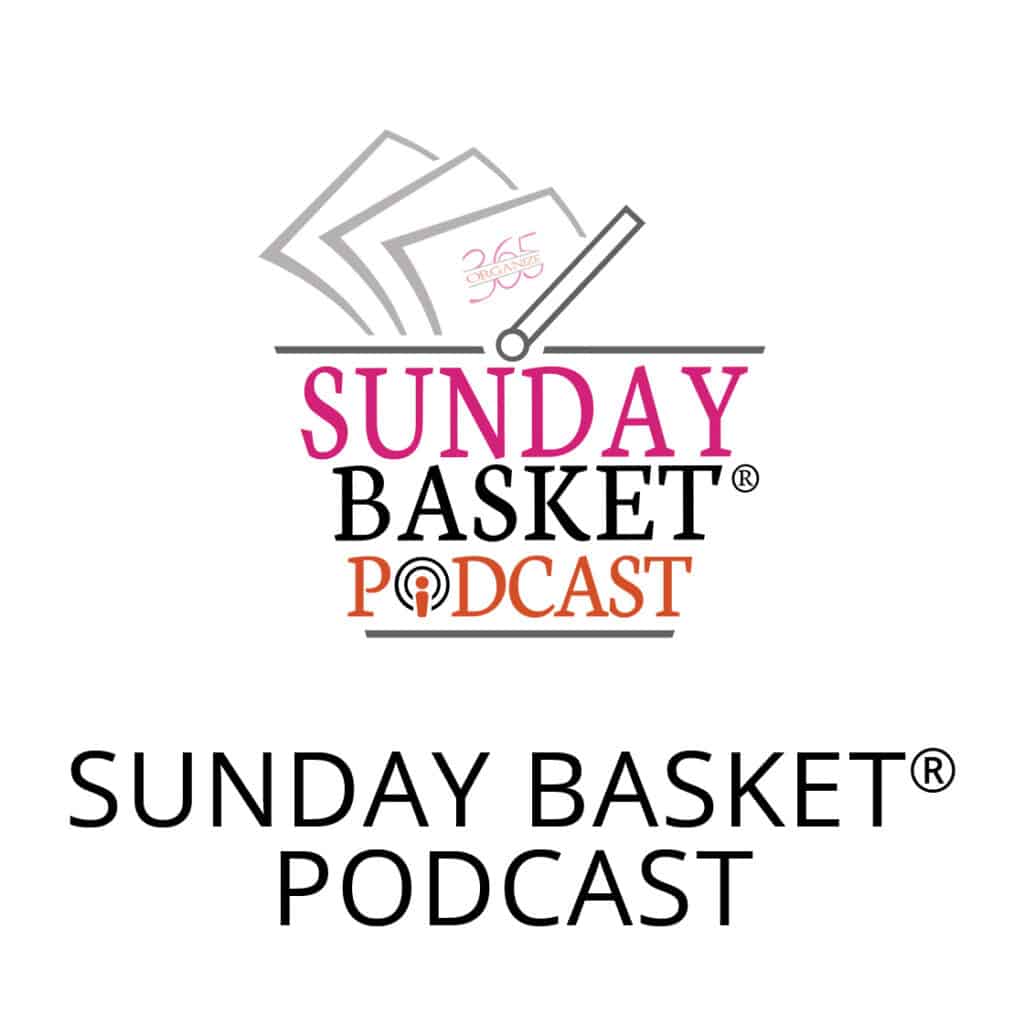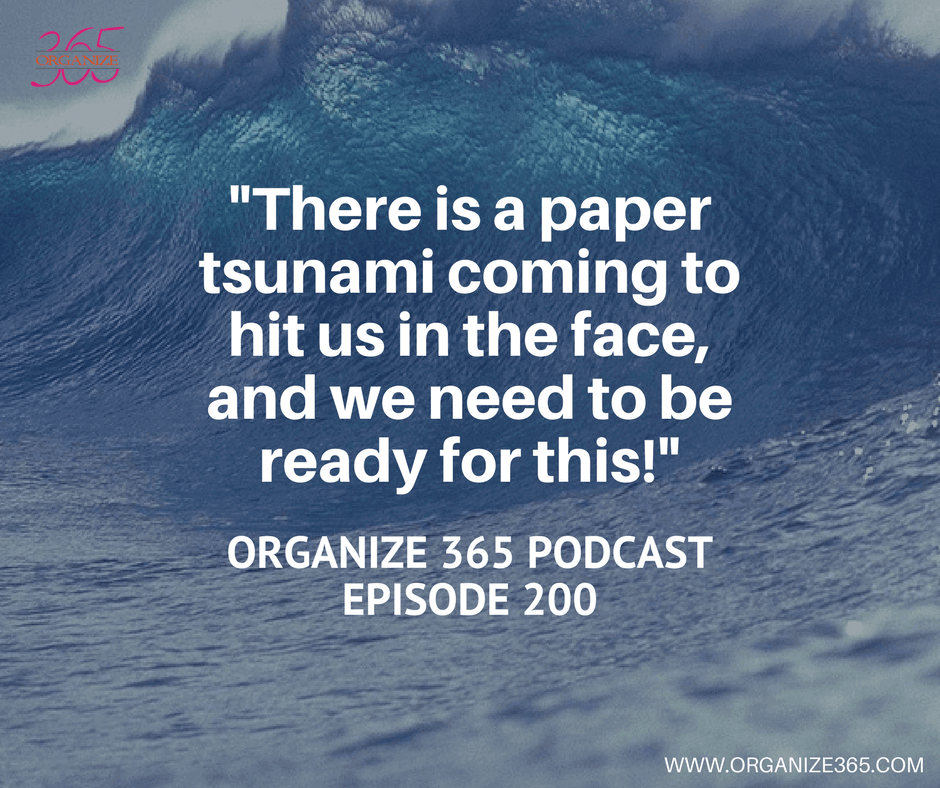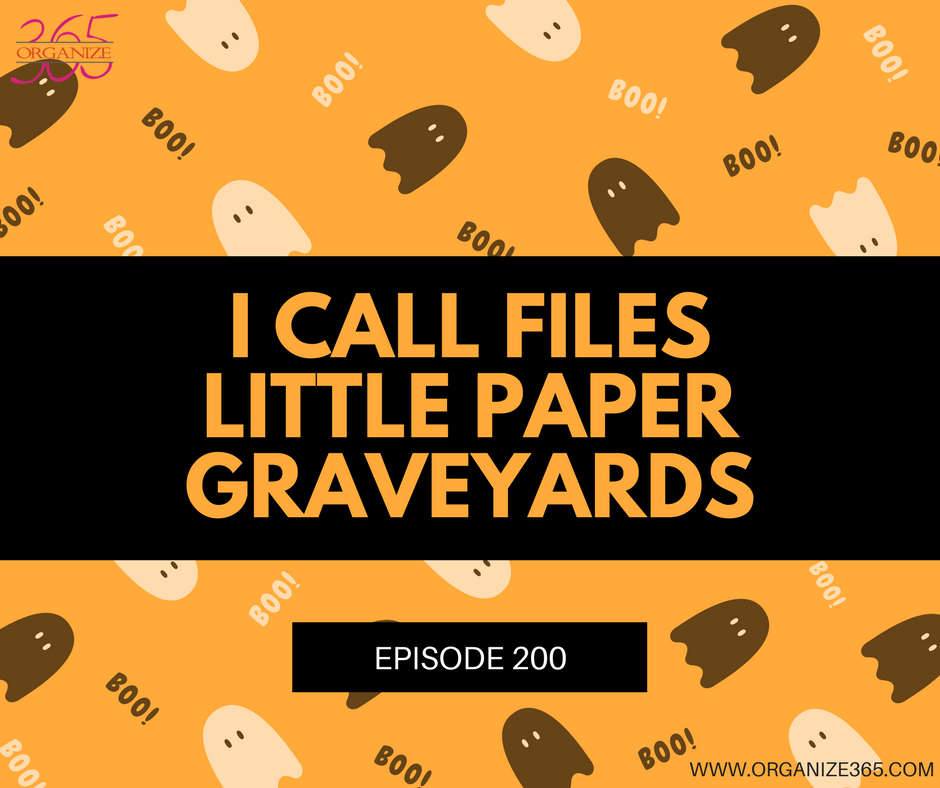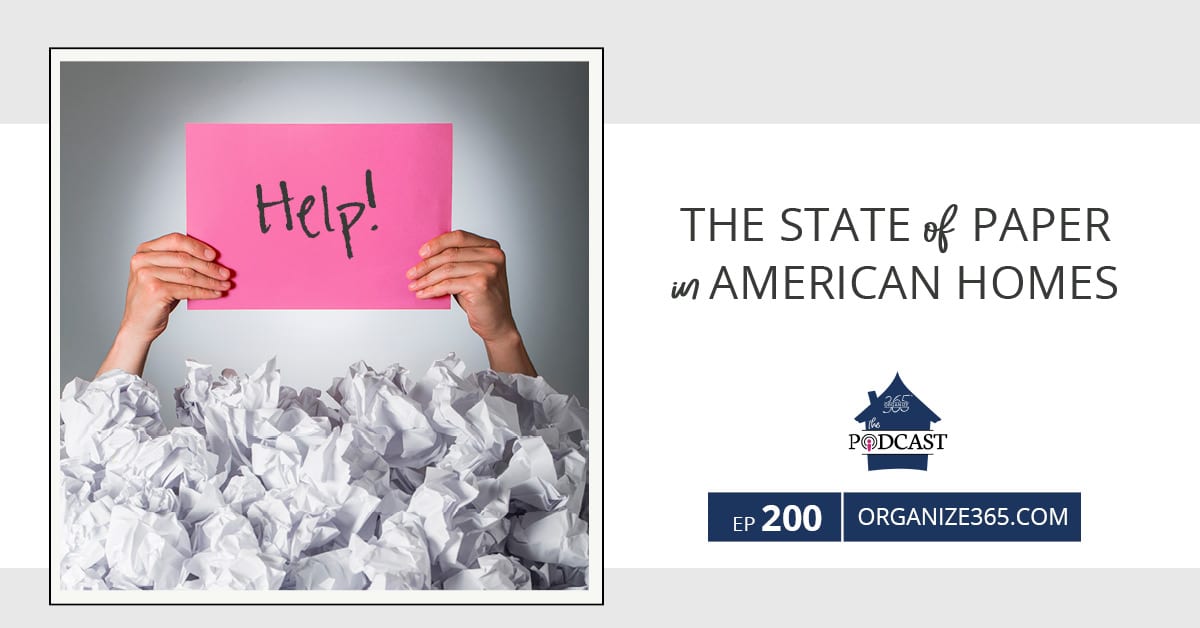
This week’s podcast episode is number 200.
200 episodes. Can you believe it?!
As if that wasn’t exciting enough, last week the Organize 365 podcast surpassed 2 million downloads!
Thanks to each and every one of you who have listened to my podcast and who have supported me with Organize 365.
I thought a lot about what to cover on my 200th episode and decided that I wanted to talk about paper, one of my favorite topics.
Also, this week I have a few special announcements to make… all of them related to paper!
I’m launching a second podcast – The Sunday Basket® Podcast
In January 2018, I’m going to launch a second podcast called The Sunday Basket® Podcast.
Recently, I’ve been wanting to talk more and more about paper organizing, but I know that not everyone wants to hear about it. So I decided to create a separate podcast where I can talk about paper organizing to my heart’s content for anyone who wants to listen.
By having a separate podcast all about paper organization, I can focus the Organize 365 Podcast on my philosophy for home organization, mindset, other fun organizational predicaments, and productivity.
Every generation handles paper differently
Every generation looks at organization differently, and as such, they handle their paper differently.
When we understand our generation, we develop an understanding of how we handle paper.
First, I just want to make it clear that whatever generation you are, it’s not a judgement of you. It’s just an age grouping that says what life experiences you have had. It tells us interesting things, like what age you were when you encountered technology.
Generation age ranges are not really precise, but generally we have Gen Z which is everyone under 18. Then we have Millennials who are in their 20s and 30s. Gen X are in their 40s and 50s. Baby Boomers are late 50s and 60s. Then we have the Silent Generation, people who were born in-between the two world wars during the 1920s through to 1945.
Here’s an example of how we handle paper differently. The majority of people today do not use checkbooks anymore. However, I spend 30-40 minutes a week balancing my checkbook and reconciling our household transactions. I can’t comprehend how other people don’t do this! As a Gen X person, I was brought up with paper.
On the other hand, Millennials will tell me that they do not have any paper. It is not a “thing” for them at all. What is a checkbook?!
The paper tsunami is coming
The majority of paper is with the Silent Generation and the Baby Boomers.
These generations set up filing cabinets. They did not have computers so paper ruled.
Today, we tend to continue with the filing cabinets, but our habits have changed… rather, our filing cabinets have become a habit and not a resource.
We have all sorts of paper that we file away, but if we want to look something up, we don’t go to our paper files, we look things up online!
Realistically, 80% of the paper in our filing cabinets right now should be shredded.
The issue is that none of us want to shred all of that paper. But neither do Baby Boomers and neither do the Silent Generation.
One of these days someone is going to have to go through all of this paper. Even if you don’t do this with your own files, you may end up doing it for your parents and your grandparents.
All of these files need to be sorted through, because while 80% of it most likely can be shredded, the other 20% is very important. For example, it could be an important part of your family history, or even lead to cold, hard cash. I have found both when sorting through my family paperwork!
I helped a client with her paperwork when her husband died and there were multiple 6-figure investments hidden in the piles of paperwork that, thankfully, we discovered. This happens more than you can imagine.
Almost always, when circumstances lead to you having to sell your parents’ home, paper is the one thing that gets boxed up to deal with “later.” Your parents’ generation has likely lived in their home for decades, and therefore, there is SO much to sort through. Paper always seems to be the thing that can be boxed up. The issue is that “later” can become decades. This can result in generations of paperwork boxed up in people’s basements. After all, who has time to sort through it all?
I’m writing a new book about paper organization!
I’m so excited to share with you that I’m writing a book on paper organization.
My book will help you handle the paper tsunami that is is coming – the tsunami consists of your own paperwork, plus your parents’ paperwork, and your grandparents’ paperwork.
We don’t need filing cabinets anymore. I call files little paper graveyards!
We need all of our information digital and scanned. My book will take you from the Sunday Basket® to online digital scanning.
My goal is to provide the road map that people need to help them tackle their paper and NOT keep it out of sight and out of mind in the basement anymore!
With all the natural disasters that have been happening lately, I am more inspired than ever to help people get their paper digitalized so that it’s always available to them.
There is a paper tsunami coming… and we need to be ready!
Please take the household paper survey.
Creating a Schedule Printable
Finally, for the past couple of months, I have focused on productivity, looking at goal setting and routines. Many of you downloaded my Creating A Schedule printables. I hope you found them useful. If you haven’t downloaded it yet, what are you waiting for?!
One final note… In the podcast, you’ll hear me mention adding a new front page to the printable that lists the 5 podcasts related to it… why you need a morning routine, afternoon and evening routine, how to plan your week, and how to set goals. Well, I didn’t do that after all so I’ve just linked to them here. Now that’s productive!







